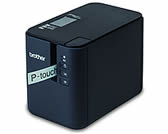PT-P950NW
FAQs & Troubleshooting |

PT-P950NW
Date: 26/10/2020 ID: faqp00100020_000
What are WPA-PSK/WPA2-PSK, TKIP and AES?
WPA, short for a Wi-Fi Protected Access®, is a data encryption specification for a wireless LAN. It improves upon the security feature of WEP by using Extensible Authentication Protocol (EAP) to secure network access and an encryption method to secure data transmissions.
WPA is designed for use with an 802.1X authentication server that distributes different keys to each user. However, it can also be used in a less secure "Pre-Shared Key (PSK)" mode. PSK is designed for home and small office networks where every user has the same passphrase. WPA-PSK is also called WPA-Personal. WPA-PSK enables the Brother wireless machine to associate with access points using TKIP or AES encryption method. WPA2-PSK enables the Brother wireless machine to associate with access points using AES encryption method.
TKIP (short for Temporal Key Integrity Protocol) is an encryption method. TKIP provides per-packet key mixing a message integrity and re-keying mechanism.
AES (short for Advanced Encryption Standard) is the Wi-Fi® authorized strong encryption standard.
WPA-PSK/ WPA2-PSK and TKIP or AES use a Pre-Shared Key (PSK) that is 8 or more characters in length, up to a maximum of 63 characters.
PT-P750W, PT-P900W, PT-P950NW
If you need further assistance, please contact Brother customer service:
Content Feedback
Please note this form is used for feedback only.